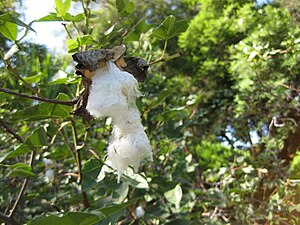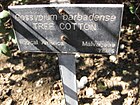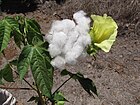Note: This is a project under development. The articles on this wiki are just being initiated and broadly incomplete. You can Help creating new pages.
Difference between revisions of "Gossypium barbadense"
| Line 1: | Line 1: | ||
[[File:Gardenology.org-IMG 2027 hunt09oct.jpg|thumb|right]] | [[File:Gardenology.org-IMG 2027 hunt09oct.jpg|thumb|right]] | ||
| + | '''Gossypium barbadense''' is an evergreen perennial plant with few or many strong, ascending stems that become more or less woody. It grows about 3 metres tall. This species has been in cultivation for so long that its region of origin is uncertain, but was possibly Peru. | ||
==Uses== | ==Uses== | ||
| − | {{Uses|}}, {{Uses|}}, {{Uses|}}, {{Uses| | + | {{Uses|Irregular menstruation}}, {{Uses|High blood pressure}}, {{Uses|Skin rash}}, {{Uses|Itchy skin}}.<ref name="Uses"/> |
==Parts Used== | ==Parts Used== | ||
| − | {{Parts Used|}}, {{Parts Used| | + | {{Parts Used|Leaves}}, {{Parts Used|Seeds}}. |
==Chemical Composition== | ==Chemical Composition== | ||
| Line 28: | Line 29: | ||
==Habit== | ==Habit== | ||
| − | {{Habit|}} | + | {{Habit|Evergreen shrub}} |
==Identification== | ==Identification== | ||
| Line 47: | Line 48: | ||
==Mode of Propagation== | ==Mode of Propagation== | ||
| − | {{Propagation|}} | + | {{Propagation|Seeds}} |
==How to plant/cultivate== | ==How to plant/cultivate== | ||
| − | <ref name="How to plant/cultivate"/> | + | Sea Island cotton can be grown in the dry to moist tropics and subtropics, where it is found at elevations up to 1,500 metres.<ref name="How to plant/cultivate"/> |
==Commonly seen growing in areas== | ==Commonly seen growing in areas== | ||
| Line 66: | Line 67: | ||
<references> | <references> | ||
| − | <ref name="chemical composition">[ | + | <ref name="chemical composition">[Chemistry]</ref> |
| − | <ref name="Leaf">[ | + | <ref name="Leaf">[Morphology]</ref> |
| − | <ref name="How to plant/cultivate">[ | + | <ref name="How to plant/cultivate">[http://tropical.theferns.info/viewtropical.php?id=Gossypium+barbadense Cultivation]</ref> |
<ref name="Uses">Indian Medicinal Plants by C.P.Khare</ref> | <ref name="Uses">Indian Medicinal Plants by C.P.Khare</ref> | ||
</references> | </references> | ||
==External Links== | ==External Links== | ||
| − | * [ ] | + | * [https://pfaf.org/user/Plant.aspx?LatinName=Gossypium+barbadense Gossypium barbadense on pfaf.org] |
| − | + | ||
| − | |||
[[Category:Herbs]] | [[Category:Herbs]] | ||
[[Category:Pages without herbs images]] | [[Category:Pages without herbs images]] | ||
Latest revision as of 16:30, 13 May 2020
Gossypium barbadense is an evergreen perennial plant with few or many strong, ascending stems that become more or less woody. It grows about 3 metres tall. This species has been in cultivation for so long that its region of origin is uncertain, but was possibly Peru.
Contents
- 1 Uses
- 2 Parts Used
- 3 Chemical Composition
- 4 Common names
- 5 Properties
- 6 Habit
- 7 Identification
- 8 List of Ayurvedic medicine in which the herb is used
- 9 Where to get the saplings
- 10 Mode of Propagation
- 11 How to plant/cultivate
- 12 Commonly seen growing in areas
- 13 Photo Gallery
- 14 References
- 15 External Links
Uses
Irregular menstruation, High blood pressure, Skin rash, Itchy skin.[1]
Parts Used
Chemical Composition
Common names
| Language | Common name |
|---|---|
| Kannada | |
| Hindi | |
| Malayalam | |
| Tamil | |
| Telugu | |
| Marathi | |
| Gujarathi | |
| Punjabi | |
| Kashmiri | |
| Sanskrit | |
| English |
Properties
Reference: Dravya - Substance, Rasa - Taste, Guna - Qualities, Veerya - Potency, Vipaka - Post-digesion effect, Karma - Pharmacological activity, Prabhava - Therepeutics.
Dravya
Rasa
Guna
Veerya
Vipaka
Karma
Prabhava
Habit
Identification
Leaf
| Kind | Shape | Feature |
|---|---|---|
Flower
| Type | Size | Color and composition | Stamen | More information |
|---|---|---|---|---|
| {{{5}}} |
Fruit
| Type | Size | Mass | Appearance | Seeds | More information |
|---|---|---|---|---|---|
Other features
List of Ayurvedic medicine in which the herb is used
Where to get the saplings
Mode of Propagation
How to plant/cultivate
Sea Island cotton can be grown in the dry to moist tropics and subtropics, where it is found at elevations up to 1,500 metres.[4]
Commonly seen growing in areas
[[:Category:Herbs that are commonly seen in the region of |]], [[:Category:Herbs that are commonly seen in the region of |]], [[:Category:Herbs that are commonly seen in the region of |]], [[:Category:Herbs that are commonly seen in the region of |]], [[:Category:Herbs that are commonly seen in the region of |]].
Photo Gallery
References
- ↑ Indian Medicinal Plants by C.P.Khare
- ↑ [Chemistry]
- ↑ [Morphology]
- ↑ Cultivation
External Links
- Ayurvedic Herbs known to be helpful to treat Irregular menstruation
- Ayurvedic Herbs known to be helpful to treat High blood pressure
- Ayurvedic Herbs known to be helpful to treat Skin rash
- Ayurvedic Herbs known to be helpful to treat Itchy skin
- Herbs with Leaves used in medicine
- Herbs with Seeds used in medicine
- Habit - Evergreen shrub
- Index of Plants which can be propagated by Seeds
- Herbs that are commonly seen in the region of
- Herbs
- Pages without herbs images




